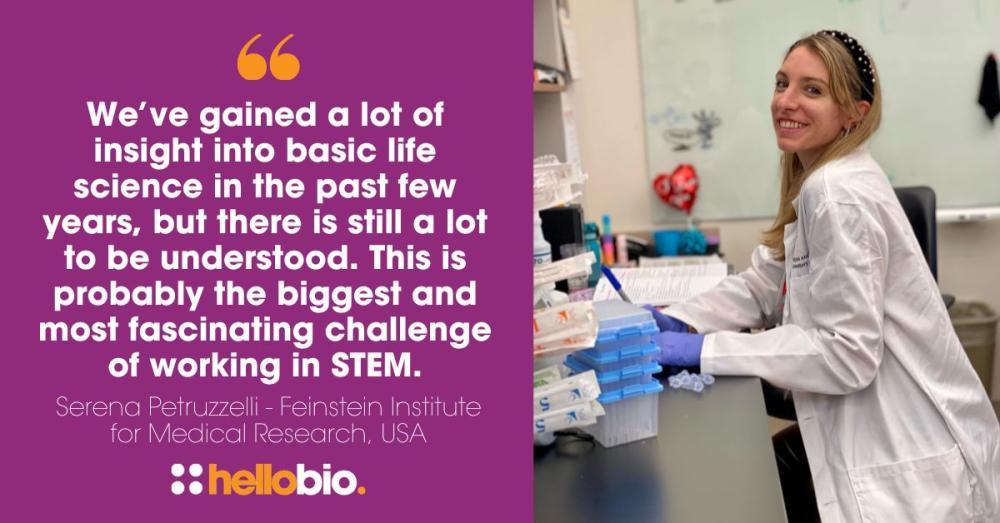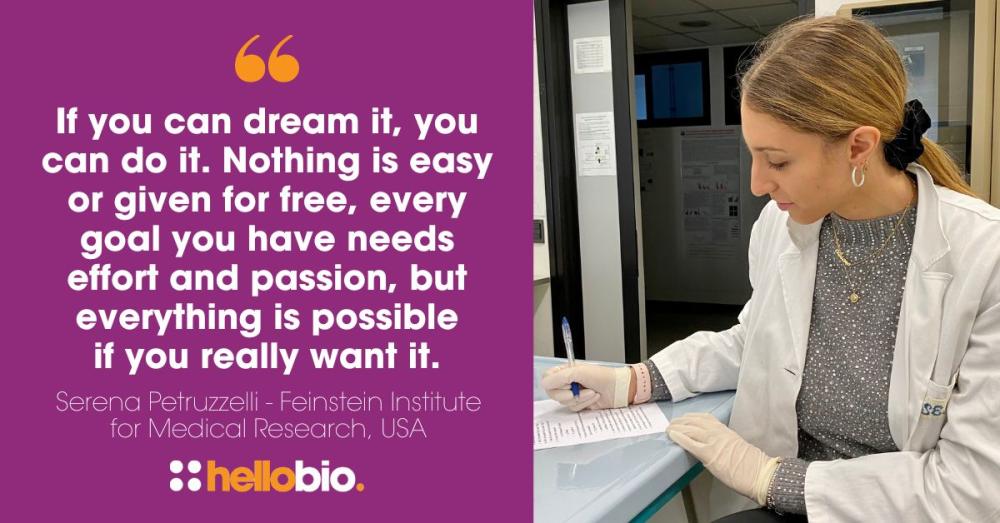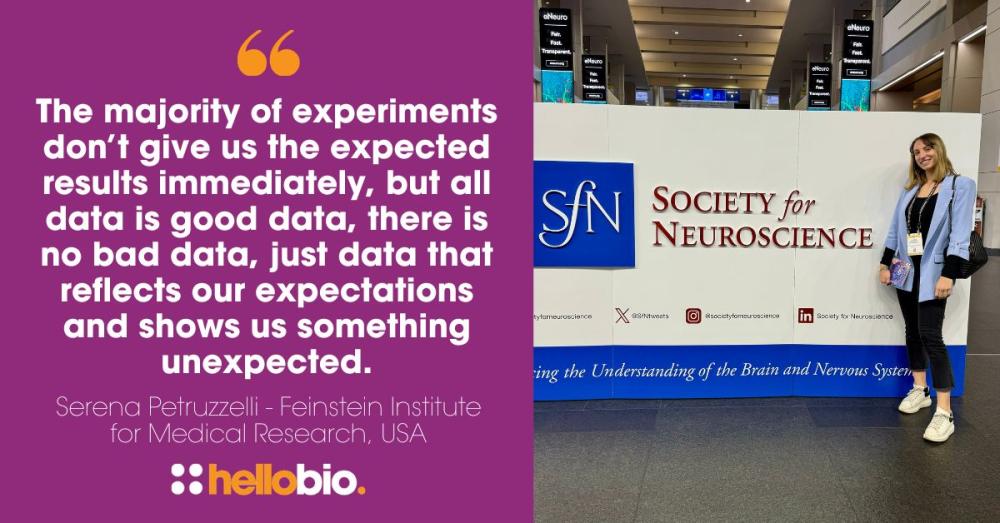Meet Our Lab Heroes Awards™ 2023 Highly Commended Nominees: Serena Petruzzelli
We’re delighted to introduce another of our Lab Heroes Awards™ 2023 Highly Commended nominees! Serena Petruzzelli was nominated by her colleague Saher Chaudhry who praised her resilience, her strong work ethic, and described her as an “all-round talent”.
Serena is an aspiring medical scientist working in the Tracey Lab at the Feinstein Institute for Medical Research, USA. She grew up in Milan, Italy, and completed a bachelor’s degree in biomedical engineering, a second bachelor’s in biology and is currently working towards a master’s in biomedical sciences which she hopes to complete very soon. She moved to the USA in 2022 to work in the Tracey Lab, and presented some of her research at SfN 2023. She was also named as second author of a paper at the same conference, and in the upcoming spring semester she will give a talk about the pathophysiology of the nervous system to master’s students.
We spoke to Serena about her current research work, the challenges of moving to a new country, and her hopes for the future!
Congratulations, Serena! How did it feel when you found out that your colleague had nominated you as their Lab Hero?
I was very happy, thrilled and honored to be nominated as someone’s hero! It was unexpected but definitely a pleasant surprise. I got suspicious when my co-worker asked me for a picture of myself working in the lab, but I thought it could be for a Christmas present. I had no idea at all about what was going on!
How did it feel when you found out our judges had chosen you as 'Highly Commended'?
There is a funny story behind this. I was leaving my house to go to work when I got the email, and I was so surprised that I almost fell down the stairs! I had to read it a couple of times to fully realize what was happening. I am grateful to my lab for accepting me and supporting me from day zero. This recognition means a lot to me. I am very grateful to Saher for the nomination, she has always supported me and believed in me since I moved to my lab from Italy. I am also thankful for everyone in the Tracey lab, they are like family to me.
Why do you think it’s so important to celebrate life science researchers, and what more could be done to show life scientists recognition?
We, as scientists, work very hard to try to figure out how the human body works and what we can do to prevent and cure diseases. I think sometimes there is a lot of confusion and misunderstanding on what we actually do and why our job is so important for the community. I don’t know honestly what could be done to show life scientists more recognition, but a better understanding of research would probably help.
What do you enjoy most about working in STEM?
I’ve always been a curious person so I think that the unknown elements of science is what intrigues me the most. We’ve gained a lot of insight into basic life science in the past few years, but there is still a lot to be understood. This is probably the biggest and most fascinating challenge of working in STEM.
Did you always want to be a scientist when you were younger, and if so, why?
Honestly when I was a little kid my dream was to be either a fashion model/stylist or an astronaut, as if these jobs have something in common! By the way, I remember being in middle school during biology class and my teacher was explaining to us the differences between animal and plant cells. That was the precise moment I fell in love with biology and the human body, but also the moment I realized I wanted science to be my life.
Can you tell us a bit more about what you're working on in the lab at the moment?
I am currently involved in two different projects in my lab. One of them is part of my master’s thesis from which I will graduate in February 2024 in Biomedical Sciences. This project is focused on brain mapping and imaging during inflammatory responses to cytokines. The second project I oversee is about the study of the different brain regions during the progression of rheumatoid arthritis.
What does a typical day in the lab look like for you?
To be honest there is no typical day for me, each day is different from the previous one and the next one. It may seem annoying to some people, not having a “daily pattern”, but I like it. It helps you to not get bored of the routine, and you can do different things every day.
What do you think are the biggest challenges facing life scientists at the moment?
Unfortunately, I’d say money. I am very lucky to work in a well-funded lab, but not all researchers can rely on big grants, and science becomes very hard when funds are low. Other than that, even if several conditions have been cured, nowadays there are way more diseases than a few decades ago. The use of medications is really helpful, but it’s increasing antibiotics resistance in several bacteria species which are no longer responsive to therapies. This is a big challenge.
Your colleague praised your ability to quickly adapt to lab work in a new country. What were the biggest challenges you faced when leaving home to work in the USA?
I had always dreamed of moving to the USA since I was a little kid, so it feels like I’m living my best dream! Everything came very naturally, but of course being far from your family and friends is not always easy, and this was probably the biggest challenge of moving away from home. But I have to admit that I never felt closer to my family and friends than now!
What key piece of advice would you give to a younger scientist just starting out in their career?
There are many pieces of advice I could give a youngster starting a career in science, but what kept me pushing through all these years is thinking that “if you can dream it, you can do it”. Nothing is easy or given for free, every goal you have needs effort and passion, but everything is possible if you really want it.
How do you see your career developing in the future/where do you see yourself in 10 years?
That’s a good question! I’ve been thinking about it a lot lately and I’d love to either pursue a MD to become an onco-neurosurgeon and practice as a physician-scientist, or become a professor/PI and run my own lab. I would also love to be a college professor in neuroimmunology, since it’s my major.
Which scientists working today do you admire the most?
Well, I may be biased in saying this because I work in his lab, but my greatest admiration goes to Kevin J. Tracey. He is a neurosurgeon who became interested in basic life research and discovered the mechanism by which the efferent arm of the inflammatory reflex works. Thanks to his discovery, new devices for vagus nerve stimulation are now used in clinical trials to treat rheumatoid arthritis and Crohn’s disease. Other than being a great scientist, he is also a wonderful person, he is available to talk and to listen to you, he is very supportive, and he always acts for the best of us all. Since I moved to the US, he has always been a reference figure I know I can count on.
What’s your favourite science quote?
I literally love Edison’s quote about his failures in making the light bulb, he said “I have not failed 10,000 times. I have succeeded in proving that those 10,000 ways will not work”. I think it’s very relatable for what I do, as the majority of experiments don’t give us the expected results immediately, but as we always say in my lab “all data is good data, there is no bad data, just data reflecting our expectations and data showing us something unexpected”.
Is there anything else you would like to tell us, eg. specific issues that you are involved with or are passionate about?
I’ve always been interested in nature and have supported animal welfare associations. I recently adopted a highland cow and her mom (my Truth and Audrey) and they’ve been saved from slaughter. It makes me so happy when I can help someone have a better life, which could be either through my work or charity.
________________________________
If you enjoyed this article, why not check out the other resources available on our blog. We are passionate about supporting life scientists including early career life scientists and PhD students - with really low-priced reagents, antibodies and biochemicals, early career scientist grants, and resources to help with both personal and professional development. We know how tough it is - so we hope you find these helpful!
More General Support for Life Scientists
For advice on wellbeing, dissertations, presenting at conferences, wellbeing, PhD support, networking and lots more, we have a huge range of articles to help - just click below:
Save up to 50% on our high purity reagents...
When you get to the stage of planning your experiments, don't forget that we offer a range of low-cost, high-purity agonists, antagonists, inhibitors, activators, antibodies and fluorescent tools (yes - they really are around half the price of other suppliers!) You can use our Quick Multi-Search Tool to search for lots of products in one go, and the range includes:
- Enzyme inhibitors and activators
- Chemogenetic ligands
- Ion channel modulators
- GPCR & ionotropic receptor ligands
- Cell biology reagents & biochemicals
Technical resources
Try our Molarity Calculator: a quick and easy way to calculate the mass, volume or concentration required for making a solution.
Try our Dilution Calculator: an easy way to work out how to dilute stock solutions of known concentrations
We also offer a comprehensive range of technical resources including antibody protocols and methods, product guides and mini-reviews:
And finally, don't forget to check back in with our blog regularly for our latest articles. If there’s something you’d love to contribute to the community, whether that’s an interview or article, drop us a line at hello@hellobio.com
---























